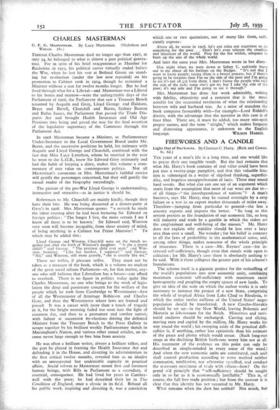CHARLES MASTERMAN
THOUGH Charles Masterman died no longer ago than 1927, at
only 54, he belonged to what is almost a past political genera- tion. For in spite of his brief reappearance as Member for Rusholme in 1923, his political career virtually ended before the War, when he lost his seat at Bethnal Green on stand- ing for re-election (under the law now repealed) on his promotion to Cabinet rank in 1914, though he remained a Minister without a seat for twelve months longer. But he had lived through what for a Liberal—and Masterman was a Liberal to his bones and marrow—were the unforgettable days of the Parliament of 1906, the Parliament that saw a Treasury Bench tenanted by Asquith and Grey, Lloyd George and Haldane, Bryce and Birrell, Churchill and Bums, Sydney Buxton and Rufus Isaacs, the Parliament that passed the Trade Dis- putes Act and brought Health Insurance and Old Age Pensions into being and paved the way for the final assertion of the legislative supremacy of the Commons through the Parliament Act.
In 1908 Masterman became a Minister, as Parliamentary Under-Secretary to the Local Government Board under Mr.
Burns, and the successive positions he held, his intimacy with Asquith and Lloyd George and Churchill, combined with the fact that Miss Lucy Lyttelton, whom he married in the year he went to the L.G.B., knew Sir Edward Grey intimately and had the habit of keeping a diary, makes this volume a com- mentary of rare value on contemporary politics. Not all Mastennan's comments or Mrs. Masterman's faithful entries will gratify the personages concerned, but they will gratify the casual reader of the biography exceedingly.
The picture of the pre-War Lloyd George is understanding, instructive and attractive—as in justice it should be.
References to Mr. Churchill are mainly kindly, though they have their bite. He was being discussed at a dinner-party at Grey's in 1908. Mrs. Masterman quotes "a remark he made the other evening after he had been lecturing Sir Edward on foreign politics : 'The longer I live, the more certain I am I know all there is to be known.' Sir Edward said, Winston very soon will become incapable, from sheer anxiety of mind, of being anything in a Cabinet but Prime Minister! " To which may be added this :
Lloyd George and Winston Churchill were on the bench to- gether just after the birth of Winston's daughter. "Is she a pretty child? said George. "The prettiest child ever seen," raid Win- ston, beaming. "Like her mother, I suppose?" said George. "No," said Winston, still more gravely, "she is exactly like me."
These are trifles, if pleasant trifles. They must not be
taken as a measure of the book, which is a volume no student of the great social reform Parliament—or, for that matter, any- one who still believes that Liberalism has a future—can afford to overlook. There is no figure in politics today quite like Charles Masterman, no one who brings to the work of legis- lation the deep and passionate concern for the welfare of the people which he took from Cambridge to Westminster—first of all the Westminster of Armitage Robinson and Charles Gore, and then the Westminster where laws are framed and passed. It was a career with more than a touch of tragedy in it, for the bright morning faded too soon into the light of common day, and then to a premature and sombre sunset, with failure at successive by-elections driving the defeated Minister from the Treasury Bench to the Press Gallery to scrape together by his brilliant weekly Parliamentary sketch in Massingham's Nation, and various other casual articles, an in- come never large enough to free him from anxiety.
He was often a brilliant writer, always a brilliant talker, and the part he played in framing the Health Insurance Act and defending it in the House, and directing its administration in the first critical twelve months, revealed him as an idealist with an unsuspected but undeniable capacity in practical affairs. Social reform to Masterman meant first and foremost human beings, with Bills in Parliament as a secondary, if essential, consequence. He had lived for years in Camber- well with the poor; he had described their lot in The Condition of England, once a classic in its fie:d. Behind all his public work, inspiring and directing it, was a conviction which one or two quotations, out of many like them, suffi- ciently express:
Above all, he wrote in 5908, let's not relax our eagerness to do something for the poor. . . Don't let's even tolerate the cruelties and injustices of the world. Pray for the fire within, adequate to burn up the sins of the whole world.
And later the same year Mrs. Masterman wrote in her diary :
One night when we were down at Selsey C. suddenly burst out to me about all his feelings on the Budget. "It's not that I want to harry people; taxing them is a brutal process, but if theres going to be taxation then I'm on the side of the poor and I'm going to see it's not all ;-:.,ot from them. I don't blame the people who take the side of the rich; some one's got to; but I take the side of the poor; it's my side and I'm going to see it through."
Mrs. Masterman has done her work admirably, writing with fidelity, objectivity and a restraint that is the more notable for the occasional revelation of what the relationship between wife and husband was. As a mine of anecdote the book compares favourably with—for example—Lord Riddell's
diaries, with the advantage that the narrator in this case is of finer fibre. There are, it must be added, too many mis-spelt proper names, and the term "alright," which makes frequent
and distressing appearance, is unknown to the English








































 Previous page
Previous page